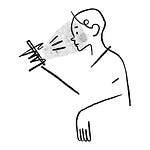If, because of everything that's going right now, on you're mourning and angry and confused and shocked — and you don't know what to do with all these emotions — there's actually a few things you can do. Tsh's friend Alecia shares what's most helpful and loving for white friends and allies, both now and for the long-haul.
Robin DiAngelo's book, White Fragility
Being nice is not going to end racism, from Robin
Just Mercy the film is available to stream for free throughout June: Amazon, YouTube
Tsh’s free weekly email, 5 Quick Things
Create Your Rule of Life - pay what you can
Get 25% off at LiquidIV.com and use the code GOODLIST at checkout
StoryWorth: Get $10 off your first purchase and give a great Father's Day gift
This is The Good List. I'm Tsh Oxenreider.
This is an idea. Friends, this is a different episode than what we usually do here on the pod, because I don't want to do the usual right now. If you're like me, you've been in mourning at what all is happening here in the US these days. And yet, perhaps some scales have also been lifted from your eyes regarding racism and how systemic it is and how it has not left in the 400 plus years since Europeans first came to this part of the world. You're not sure what to do with all your feelings. In this episode, I'm chatting with my local friend here named Alecia Baptiste. She and I work together and she's one of the kindest, most gracious, wisest people in my life right now. I'm very, very grateful for her. I think she's someone you need to listen to as she shares thoughts on what to do with all the uncomfortable feelings you're feeling right now.
Tsh: Hello, Alecia, how are you?
Alecia: I’m fine, Tsh?
Tsh: It's funny. I'm saying hi, but I've seen you all day and for the past three days, yes. It’s a pretend hello. For people who don't know, and I said this already in the introduction, you and I are friends and work colleagues in the Austin area. We know each other in real life, which doesn't always happen with the people I talk with on the podcast, but I wanted you to be on the show because we've had really good discussions lately. You are, I don't know if you're a leader in be the bridge or if you are a community volunteer, I don't know what your position is, but you've had really great things to say lately and to our community. I just wanted to pass the mic to you so that we could talk about this on a much bigger scale for the listeners of the show. Why don't you start us off with some of the wisdom you have dropped lately.
Alecia: I'm not a leader with Be the Bridge. I have been a part of Be the Bridge organization just engaging in conversation, learning from, they have just a wealth of resources and I've used those resources to really educate myself, to really understand more about the injustice and really racism that I've experienced and others in my family and the black community have experienced throughout the years. As a black person, it's not like I'm not aware that there's racism. It's something that is, you and I have talked about this, it's the water that we're all swimming in. I know it's there, but I don't necessarily understand how things became the way that they are. I think the Be the Bridge resource has really helped me to understand it took away the fog, okay, you're walking in a fog and you're getting poked and you're like, who's poking me? Where's it coming from? You're turning everywhere, trying to figure out where the poke coming from and Be the Bridge and their educational materials takes the fog away and it's like, oh, okay. I see where the poking is coming from. It's very clear. Oh, it's that? It's that it's that. It really validates your experience as a person of color because you find yourself walking in life constantly second-guessing yourself. You have an experience in your life, okay, is that because I'm a black woman or what? I tend to be one that tries to give people the benefit of the doubt all the time. They probably didn’t, maybe they were just having a bad day. The materials really helped me and really validated some things that I just saw and experienced myself.
Tsh: One of the reasons I thought of you for this week's episode is because, among the people that I interact with online, one of the most common responses to everything happening right now in our country is I wish I knew what to do or what can I do. I would wager a guess to say, most of our listeners are white and are probably white middle-class women. These are white middle-class women who care deeply and really want to do the right thing, but they feel stuck. I know you have shared some of your thoughts and I have found them so profoundly wise.
What would you say to someone who really does have a good heart about this and wants to do something, but doesn't know what to do?
Alecia: Lots of thoughts on that. I guess the first thing I would say is welcome. There’s a sense of conflict that I have seen and heard that same sense of conflict from other blacks when their friends or acquaintances, they're posting now and they're expressing this, oh my gosh, what do I do? What do I do? What do I do? There's a part of you that's like, yeah, finally they're getting it. We've been saying this for a long time. Then there's the other part of it is, that's like, oh my gosh, they're just getting it and we've been saying this for so long. It's taken seeing a man or saying these people on video being lynched, basically, for you to finally believe what we've been trying to tell you for a long time.
I guess the first recommendation that I would give you is, first of all, to be patient with us, because this is a really, really difficult time, of a lot of us, are hurting. A lot of us are angry. A lot of us are just trying to deal with our own emotions right now. We're still trying to live. You and I are work colleagues. I still had to work for the past two weeks. I still needed to focus on the work that needed to be done. I couldn't allow my grief, the fears that I may have about my own children. I couldn't allow that to keep me from doing the work that I needed to do. Be patient.
I would say reach out to your black friends, acquaintances, neighbors, but I want to tell you to reach out in a very specific way, in a way that actually will be beneficial to the person that you're reaching out to. This is how I want you to reach out to them. First of all, just let them know that you're with them. Let them know that you're with them for the long haul and resist centering yourself in the communication.
Tsh: Can you get into what that means? Because I think that's really important, especially for people that don't even know they're centering themselves.
Alecia: Well, I'll tell you, I've had lots of people to reach out to me and centering yourself, looks like this, and this is the normal response, that’s why I'm specifically saying this, is you reach out and instead of making it about, oh my gosh, how are you doing? What can I do for you? It becomes, oh my goodness. I feel so terrible. I can't believe I'm just learning about this. You're making it about your feelings and everything that you're going through. One lady, in particular, contacted me and it was almost like her own personal therapy session. She began to tell me everything was going through and feeling. And I was like, I thought she was checking in on me. We cannot bear right now. We cannot bear your burdens on top of what we're going through. If you think about, if you were contacting a friend who had just gone through something difficult, they lost someone, you would have the awareness that right now they need you. That's what I would say, right now, we need you. We cannot, it's not our job to now make you feel better about the fact that you feel really bad and sad, and maybe you feel really guilty about being white. Please don't place that burden on us to make you feel better.
As a matter of fact, I want you to sit in that discomfort. I was telling Tsh, telling you earlier day about my best friend. We call each other sisters and she is a white lady. She's about as white as she can be. You look at the two of us and you never put us together, but we're just like soul sisters. We love each other so much. One of the things she told me this weekend was that she felt judged as being white. She felt so terrible. She cried on the phone with me on FaceTime with me. She was just like, I just feel judged that people see me because I'm white. They just assume that I’m this, that and the other. And I told her, and this is somebody I love, and I do not want to see her hurting. She does not want to see me hurting either. I said I want you to sit with that. I want you to sit in that feeling of feeling judged because you're white. That's our reality all the time.
Tsh: We talked earlier about this idea that because our entire culture is built for white people, we’re not even aware of the centering and we're not even aware of how we make things about us until we feel that discomfort. We don't do a good job sitting in discomfort. We don't have a good historical record of holding onto that open-loop and just sitting with it. I think you're saying that is exactly what I need to hear because it's so tempting for us to want to do A, B, and C and then feel like we did something. As well-intentioned as that might be, that’s still about us. It's still about us feeling better.
Alecia: Yes. I appreciate you saying that because a lot of times you don't even realize that even your reaching out is about you. Even the, I just have to tell you, I'm just so sorry. I'm just so sorry can be a way of saying I'm not a bad white person. I'm one of the good ones and still, that's about you again. I want when you're reaching out and, and listen, we all think about ourselves, it's not that black people don't do the same thing in some ways. But as you reach out to your friends and acquaintances resist the urge to make it about you and resist the urge to want to resolve this thing quickly. That's why I said, let your friends, let your black friends and acquaintances know I'm here, I'm in it with you for the long haul. Because to be honest with you, it means very little to me or your black friends to say, oh my gosh, I'm so sorry. This is so terrible. Tell me what to do, because we're like, yeah, you might do something today and next week, but then six months, a year, two years, five years from now, you're back to your comfortable life. You did that one little thing that now you're like, whoa, yay, I helped with the racism. I can go on to my life again. And then nothing has changed and we're still living in it.
Tsh: I think that's important because we, so often white people think of it as a news item, a thing that they hear about and because they hear about it, they think now is the time to act. It's much harder to do the mundane work when it's boring. It's not splashy headline-worthy. It's showing up and doing the workday in and day out. We're not the best at that. We do not have a good track record of that.
Alecia: This is a marathon, not a sprint. Oh, all you have to do is A, B, and C, and we're going to get rid of racism. It's going to take a lot of work. It's going to take perseverance. I want to ask your listeners to hang in there with us, hang in there with us when you're reaching out and we're frustrated because things aren't moving fast enough. I want you to hang in there when it looks like nothing is changing because the reality is, that's what we've had to do. We don't get the privilege of saying, you know what, nothing's happening. Let's just go on with life because this is our life. So we have to continue to hang in there and remain hopeful.
Just pray for us. Pray, if you’re a person who prays, pray for us. We need your prayers.
Tsh: I think it's also helpful to remember, we pray on a global scale and then a nationwide scale because of the things that we see that need, we see the wrongs that need righting. However, we also need to pray for you guys and our brothers and sisters and our colleagues and our work friends, just individually, as people, the mental health, the emotional health, the safety of your kids. You have two boys that I think about frequently these days. And girls too. We have to pray in a way that white people don't have to think about. We just don't, and it's not our fault, it’s not something that I created, but it's something that I am unaware of unless I am very intentional about.
Alecia: Right. It's not something you, it's not your fault personally. You're right. I appreciate your prayers. I do.
[AD BREAK]
Tsh: Okay. We're back. What's funny is I can feel even the tension with people listening right now, thinking, okay, you're telling me don't try and find something to do. Just sit in the discomfort yet, what can I do?
Alecia: There are things you can do, but I wanted to say that as the first thing is just, first of all, know that whatever you're doing now, that's not going to fix the problem. We want you to be with us. We want you to lament with us. That's one thing. The next thing I want you to do is I want you to educate yourself. That is so important because part of the reason you just heard it and seen, even though it's been here for hundreds of years is because of a lack of awareness.
There are certain things that are at work that are beneficial for you that keeps you from being able to see things. It's actually beneficial to you to not see them. Educate yourself. A couple of things I would recommend, Robin Diangelo has some great materials. If Google her, she's written a book called White Fragility. She has great videos, and it really helps you to understand some of the ways in which white people respond when these types of things are brought up and how you're just blind to it. You just can't see it because I'll let you listen to the materials. It's just some great material. She talks about racism and what we find is that when you don't understand racism, most white people have a very simplistic definition of racism, which includes, there's a bad person with malicious intent that seeks to harm a black person, Latino, or some other person of color versus it's much deeper and more insidious than that.
Spend some time learning about racism. Robin Diangelo is a great resource, and her book and great videos. I love her videos. Be the Bridge has lots of resources for you to educate yourself.
Tsh: Latasha Morrison has done amazing work with that. I'm really, really impressed. I was just looking at it. They've got stuff for youth, for teens, and you were even saying that maybe even some college students, I'm not quite sure, I'll look into that. It looks like there are some classes you can take and especially this summer over Zoom.
Alecia: I think they have a whiteness intensive course where you really learn about what whiteness is. I think their most recent class has filled up. I mean, people are hungry for understanding and that's exciting to me. We just don't want this to be a fad and then everybody can, oh, wow, I learned all this stuff and this was great and then back to life as normal. Keep pushing through, stay with us in the long haul.
Another thing that you can do is support organizations that are fighting injustice. There are organizations who have been on the front lines, who have been deeply, they have done some great work. A couple of them, Be the Bridge is one. EJI, which stands for Equal Justice Initiative, I think? Bryan Stevenson, he wrote the book, Just Mercy. The movie that came out recently, “Just Mercy”, is about him and some of his work. I would highly recommend that you support their work. NAACP, you can support their work. Financially support their work. Also, if you go to their websites, EJI.org, International Justice Initiative, they also have a wealth of resources for understanding all the way back to the time of slavery. They have a museum, they have a memorial, called the Lynching Memorial. There's just a wealth of resources. I recommend for anybody to read. I've looked at the resources and I've learned a lot as well.
Tsh: It's good. I'm a huge, huge Brian Stevenson fan. We read Just Mercy in high school class this year and from what I understand for the month of June, the movie is streaming for free on all sorts of platforms. I think it's a great time to watch that movie, even with your kids.
I'm curious, just because some of the listeners are parents if you have any thoughts for parents and what we can do with our kids?
Alecia: Yes. I will tell you that one of the most problematic things that I have seen parents do, and it's probably your parents' generation, in response to the racism that happened back in the sixties, and I've had people to actually tell me this, their parents said, oh my goodness, that cannot be, so we're going to go to the opposite extreme of we're going to be colorblind. We're not going to see color. We're just all a part of the human race. That is actually harmful. What I would say is don't teach your children to be colorblind, teach teacher children, to see us in every ethnicity. I want to be seen as a black woman, just like you wouldn't walk around and say, I don't want you to see gender. I don't want you to see that someone is male or female, no, I want you to say that I'm a woman. It's okay to see. That's part of who I am. I want you to see me as a black woman, as well. Appreciate and celebrate who we are. Don't erase who we are. Don't be colorblind. Just the things that you're learning, share these things with your children. There are lots of resources out there, books. Another thing that you may not even think about is just start ordering or going to the library and buying books with people of color centered in the stores. Your kids are young, have those books, buy books that talk about what things were like for our ancestors, and then just talk about those stories and allow your children to be sad too. It's good to be sad and angry over things that are not right. That's a good thing.
Tsh: That's a good point. I think we want to tie everything up in a pretty bow, even for our kids, maybe, especially for our kids. We forget that that's part of the process that, it shows that, it's a God-given desire in each of us, for justice, for things to be, as they should be and they’re not yet. We have hope that they will be. And you mentioned that, I loved our lunch conversation because you ended with saying that you are hopeful and I think that's encouraging for people to hear because that's surprising maybe.
Alecia: Yeah. I am hopeful. My hope comes from, I'm a believer in Christ Jesus. I believe that he has the power to overcome, actually, I believe he's already overcome every single evil, every wrong that's ever been done. I work from a place of, I am victorious and I work from a place of, the victory is promised. We just have to do the work to see it come to fruition. That is my hope. My hope is in him. I'm hopeful just seeing that though we've seen things like this happen before, wow, people are finally like, there's something different about this time and that gives me hope as well.
Tsh: I saw that quote from Will Smith about, “Racism isn't increasing, it's just getting filmed.” It's frustrating to me that so many of us are seeing it or finally believing it, even if we've heard it just because it's on video and yet people are believing it and that is something good, I guess.
Alecia: It would be worse if they weren't believing, so I'm very grateful. I am so, so grateful that finally, it seems like the veil has been lifted, and now it's like, okay, let's go to work. Let’s go to work.
One thing that I shared with you earlier, and I want to appeal to your listeners. We need you, we need our white brothers and sisters. We need you, we can't eradicate this on our own because frankly if we could, it would have been done a long time ago. We need you guys to come alongside of us and to work with us and to listen to us because we've been in this fight for a long time. We understand this far better than you do. I say that, not out of any sense of arrogance or pride, it's just we're experientially familiar. We have an invested interest in understanding it, learning about it. We’ve been in this fight for a long time. We want you to come alongside of us, but we want you to come from a posture of humility. That means again, de-centering yourself, listening, and saying, how can I help? That's the position. How can I help?
Tsh: You mentioned earlier too, lamenting instead of when someone shares their story and that's another form of not making it about you, but we need to be careful with how we even respond, that you're not here to share your life story with us. We're here to sit and listen, and the burden is not placed on you or should not be placed on you. Absolutely.
Alecia: But the tendency, and I've seen this over and over again, a person of color shares an experience they've had that is that they're frustrated about, that they're hurting over and I've experienced that even with my really, really good friends, they immediately turn it around. Oh, well, that's just like what I experienced, and you're like, oh my gosh, they just made it about them. It is such a gift. I will tell you, it is such a gift to just have a white brother or sister come alongside and listen with humility. And come from a posture of humility of, I don't know what it's like. I'm not going to say it's like when I, I'm just going to listen to you and I receive whatever you want to give me and you're tired and you can't give me anything right now. That is okay. But just know I'm with you.
Tsh: Yeah. That's good. I think a good way to wrap this up is something you shared a few days ago that I was thinking about on the drive home today, that this is harmful for us white people too. This is harmful in ways that we are not aware. This is necessary for us to, and it's not about us and we're not the ones, we're in the place of privilege, but this is harming us as well.
Alecia: Absolutely. Whiteness, white supremacy, racism, injustice, harms everyone. Absolutely everyone is harmed. The problem is you don't recognize that you're being harmed. When we were talking about this a few days ago, I said, you can go through your entire life, white people can go through their entire life and position themselves where they never have to encounter a person of color. You could live in your neighborhoods. You can pick schools, you can fashion your life in such a way that you're just always in your white bubble and you never even know you're missing anything. You think I have a great life. I feel safe, comfortable. My children are great. And you have insulated yourself in a place where you're missing out on things that will make your life, people that will make your life richer, perspectives that will make your life better. You don't know what you're missing because you're missing it. I really want to encourage you that this is hurting you in ways that you don't realize. Not only are you missing out on some things, but you have an unawareness of things that you're doing that actually are harmful to you. Again, educate yourself. You're gonna start to see some things in yourself that you're just blind to. Because I've been in so many spaces where I've been the only black, I can see it very clearly but you can't.
Tsh: As people stop and we wrap up this episode and we think, okay, I'm going to educate myself, I’m going to put in the show notes, links to books and organizations that you've mentioned because these places have already done so much of the work. Whenever you do want to talk to your friends of color, don't ask, where should I go? What's the first thing I should do? Because so many people have done the great work for us, for the world that when we do talk to our friends, we need to be in a posture of lament and in a posture of caring for our friend as a friend and not as a resource as well-intentioned as we might be.
Alecia: I hope that we can add to the resources as well. Support those organizations, but I just want to end by saying, listen, you post it on your social media, “I'm so sorry. I'm with you.” It doesn't change racism, even calling your friend and saying, I'm with you, doesn't change racism. What changes racism and injustice is changing the laws, upsetting the systems that are in place that allow these things to stay intact. I want to challenge your listeners to support policies that allow everyone to thrive. When you're in your own bubble of whiteness, you don't realize, you support policies that allow you and your children to thrive, but you don't realize it's at the expense of black people and other people of color. I want to challenge you to think about the policies and the government leaders that you support.
Tsh: That's an excellent point and an excellent way to end, because like we've said, when you're a fish and you're in the water, you don't even know what water is. I think that's the case with us. Those of us who live in this country that are white, we are not aware of the water. Because it's systemic, we need to be mindful of the water. If it's causing our brothers and sisters to drown and to choke, then we need to be part of changing that water. We can't just say, oh, well, that's not best for my family, especially those of us that are believers.
Alecia: Thank you so much, Tsh. I hope that this was helpful to people and I hope that they hear my heart, that this was not to heap more guilt on you, or to make you feel terrible for being white or anything like that. I love white people. I love all people. I wouldn't be on this interview if I didn't love white people. I hope that it just gives you a little bit of insight and I hope that it actually helps my black brothers and sisters that you want to reach out to so that you don't cause more pain for them.
Tsh: You're one of the most gracious and wise people I know. I'm grateful for your leadership. I'm grateful for your voice and for your leadership because you do it so well. Thank you for that.
Alecia: Thank you so much.
Tsh: Thank you so, so, so much to Alecia for taking the time after a couple of very long work weeks to talk to us here on the pod, and please join me in prayer for her and her husband and their four kids.
I've also got links in the show notes to the things she talked about, Robin DiAngelo's work, Be the Bridge, Equal Justice Initiative and more, please check them out. Be the Bridge, especially has a great getting started page, so I'll link to that as well. I'm on Twitter @tsh and sometimes on Instagram @tshoxenreider. You can also find a transcript in the show notes of this episode, number 34 and all episodes at thegoodlistshow.com. That's also where you can find stuff to things like my newsletter, books, workshop and more. Again, thanks to Alecia for sharing with us. Music for the show is by Kevin McCloud and thanks as always to Caroline TeSelle and Kyle Oxenreider for their help, as well as my furry intern, Ginny. I’m Tsh Oxenreider, and I'll be back with you soon. Thanks for listening to The Good List.










Be a Bridge